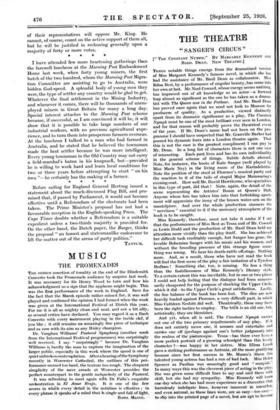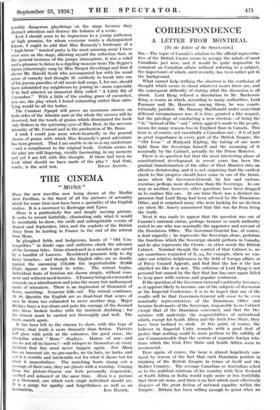THE THEATRE
"SANGER'S CIRCUS"
[" THE CONSTANT NYMPH." BY MARGARET KENNEDY BASIL DEAN. NEW THEATRE.]
THREE notable things emerge from the dramatized version of Miss Margaret Kennedy's famous novel, in which she has had the assistance of Mr. Basil Dean as collaborator. Miss Edna Best, by a performance of singular beauty, has come into her own at last. Mr. Noel Coward, whose energy seems untiring, has improved out of all knowledge as an actor—a forward leap almost as significant as the one he has taken as a drama- tist with The Queen was in the Parlour. And Mr. Basil Dean has proved once again that we need not look to Moscow for
producers of quality. As a production, viewed distinctly apart from its dramatic significance as a play, The Constant
Nymph must be one of the most brilliant ever seen in London,
and for that reason will probably prove the theatrical event of the year. If Mr. Dean's name had not been on the pro-
gramme I should have suspected that Mr. Granville Barker had poured his dynamic force into a London theatre again. That this is not the case is tho greatest compliment I can pay to Mr. Dean. In a long list of Characters there is not one case of miscasting. Each part lives and has its own individuality in the general scheme of things. Subtle details abound. Note, for instance, the boots of Kate Sanger (well played by MisS Marie Ney) in the living room of the Karindehiitte. Note the position of the stool at Florence's musical party and the reaction to it of the tails of stupid Major Mainwaringes evening coat. How well Mr. David Hawthorne, who specializes in this type of part, did that ! Note, again, the detail of the scene representing the Artistes' Room at Queen's Hall. Anyone whose fate has taken him into that forbidding apart- ment will appreciate the irony of the brown water-urn on the mantelpiece. And over the whole production simmers the " nerviness " essential to it if the necessary atmosphere of the book is to be caught.
Miss Kennedy; therefore, must not take it amiss if I say that the performances of Miss Best as Tessa and of Mr. Coward as Lewis Dodd and the production of Mr. Basil Dean held my attention more vividly than the play itself. She has achieved her difficult task creditably enough, but Sanger has gone, the lovable Bohemian Sanger with his music and his women, and without the brooding presence of this Irange figure some- thing was wrong. We hear his death-rattle offtstage. Nothing more. And, as a result, those who have not read the book will find the first scene of the play a fair imitation of a Tyrolese Bedlam ! Something else, too, is miming. No less a thing than the fastidiousness of Miss Kennedy's literary style. To a certain extent this was inevitable, but in one or two places I could not help feeling that the dialogue had been unneces- sarily cheapened for the purpose of shocking the Upper Circle, which it did—to the Upper Circle's great satisfaction. Lastly, the fine balance of the book has been lost. The dice are now heavily loaded against Florence, a very difficult part, in which Miss Cathleen Nesbitt did well. Theatrically, these may have been the right tactics to employ. The trial is an old one, but, artistically, they are blemishes.
And yet, when all is said, The Constant Nymph carries out one of the two primary requirements of any play. If it does not entirely move one, it amuses and entertains and carries one off (perhaps against one's better judgment) into the realms of the picturesque. Tessa—has there ever been more perfect portrait of a growing schoolgirl than this lovely character ?—was happy in ' her sisters. Miss Elissa Landi gave a striking performance as Antonia, all the more gratifying because since her first success in Mr. Munro's Storm this talented young actress has had a run of bad luck. Miss Helen
Spencer as Paulina was amazingly good and " rompi9h.".
many ways this was the cleverest piece of acting in the play. She was given some difficult lines to say and said them with skill, but she had my sympathy. Miss Kennedy will learn one day when she has had more experience as a dramatist that harmlessly indelicate lines, hencever - innocent in intention,
and even natural, as these lines were, are so easy—too easy-- to slip into the printed page of a novel-, but are apt 'to become terribly dangerous playthings • on the stage because- they distract attention and destroy the balance of a scene.
Lest I should seem to be ungracious to a young authoress of high promise, for whom everyone wants a distinguished future, I ought to add that Miss Kennedy's burlesque of a "high-brow" musical' party is the most amusing scene I have ever seen on the stage, allowing myself the reflection that, in the general tautness of the jumpy atmosphere, it was a relief and a pleasure to listen to a rippling measure from The Beggar's Opera (charmingly sung by Miss Margot Sieveking) and that if clever Mr. Harold Scott who accompanied her with his usual sense of comedy had thought fit suddenly to break into one of his joyous parodies of old music-hall songs, I, for one, should have astonished my neighbours by joining in—more especially If he had selected an immortal ditty called "A Little Bit of Cucumber." With a little of the cooling grace of cucumber, you see, the play which I found exhausting rather than satis- fying would be all the better.
The Constant Nymph will prove an enormous success on both sides of the Atlantic and on the whole the success will be deserved, but the touch of genius which illuminated the book only flickers in the quivering eyes of Miss Best, in the nervous intensity of Mr. Coward and in the production of Mr. Dean. I wish I could join more whole-heartedly in the general chorus of praise with which Miss Kennedy's great adventure has been greeted. That I am unable to do so is my misfortune —and a compliment to the original book. Certain scenes in the play are still lingering, vividly fascinating, in my memory and yet I am left with this thought. If there had been no book what should we have made of the play ? And that,















































 Previous page
Previous page